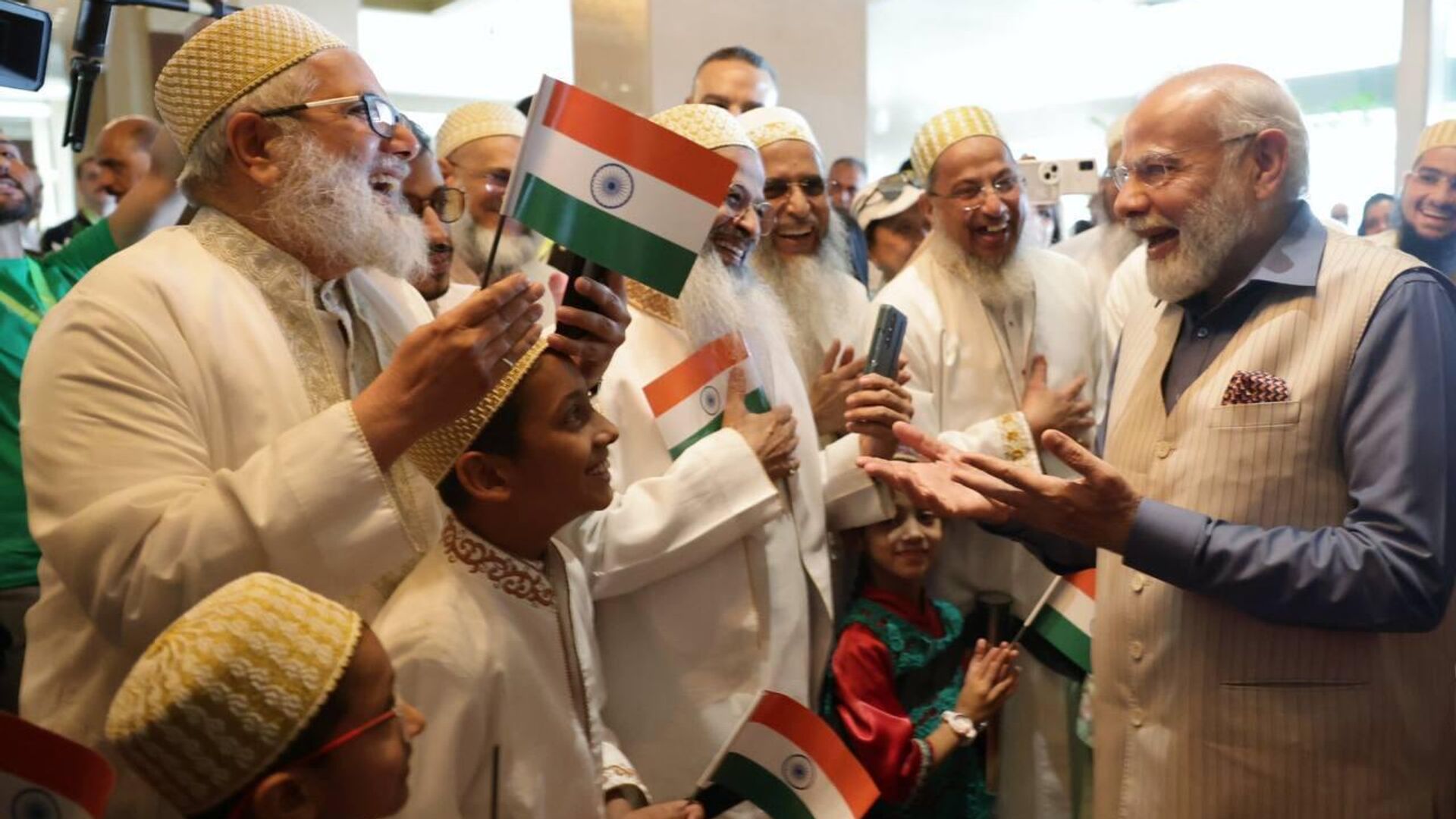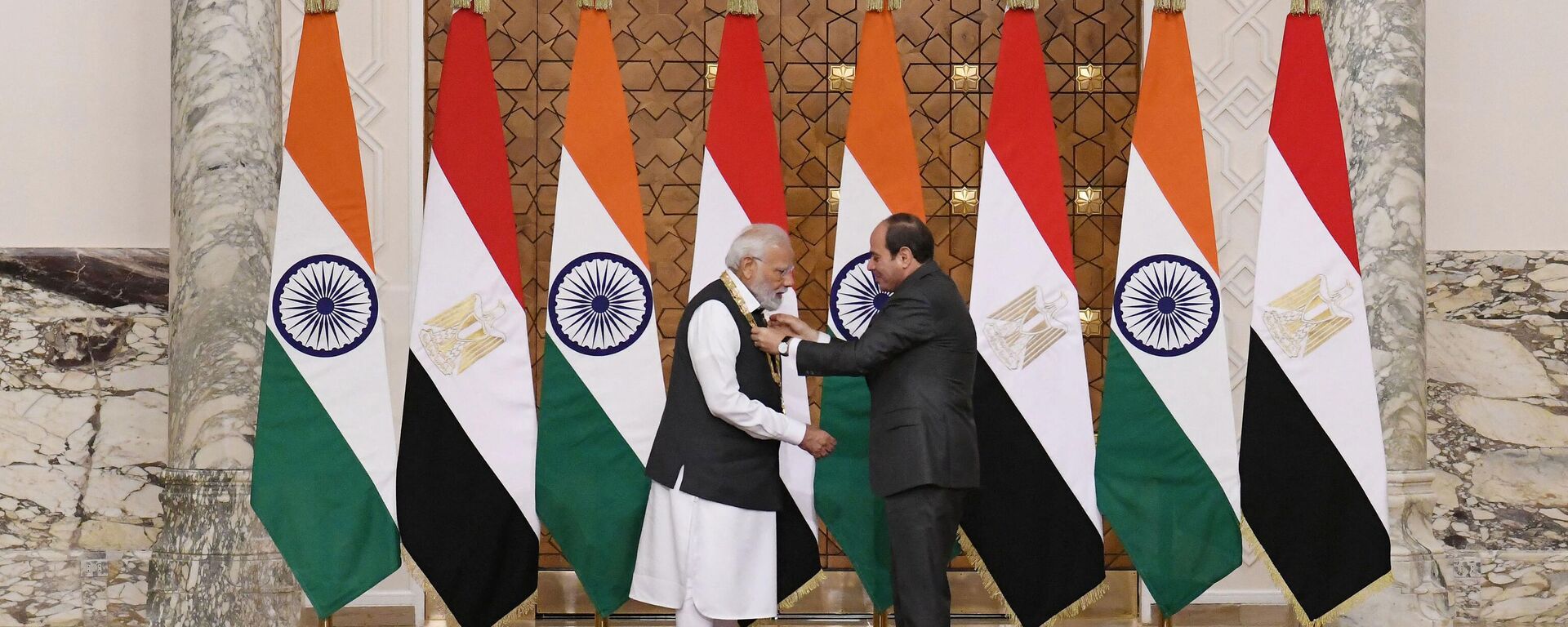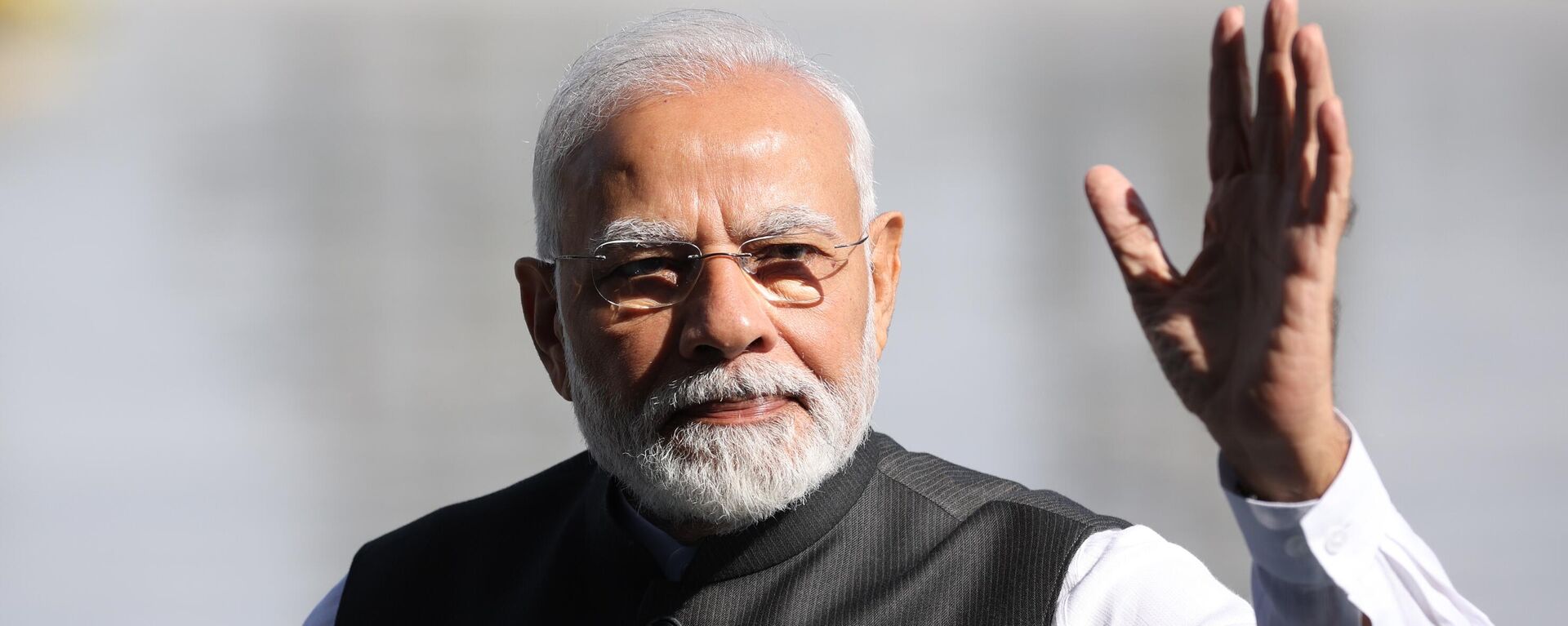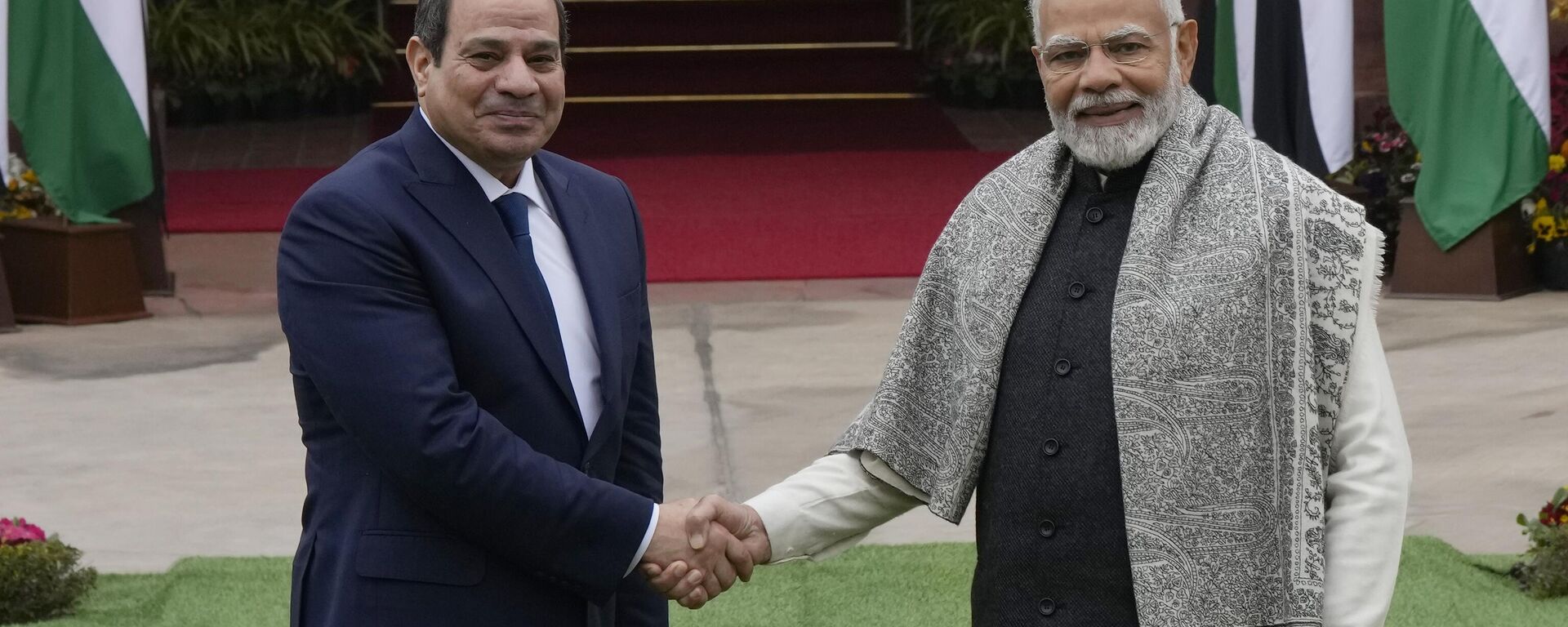https://sputniknews.in/20230627/what-is-the-common-goal-behind-growing-india-egypt-ties-2698591.html
What is the Common Goal Behind Growing India-Egypt Ties?
What is the Common Goal Behind Growing India-Egypt Ties?
Sputnik India
The common desire towards maintaining “strategic autonomy” in their respective foreign policy approaches has been driving closer ties between India and Egypt.
2023-06-27T14:36+0530
2023-06-27T14:36+0530
2023-06-27T14:36+0530
sputnik opinion
india
egypt
imf loan
ukraine
brics
global south
narendra modi
abdel fatah al-sisi
renewable energy
https://cdn1.img.sputniknews.in/img/07e7/06/19/2675877_0:133:1280:853_1920x0_80_0_0_f0d5f533bd208b971a4d8d7af92babaa.jpg
The common desire towards maintaining “strategic autonomy” in their respective foreign policy approaches has been driving closer ties between India and Egypt, an ex-Indian diplomat has told Sputnik.Anil Trigunayat, India’s former Ambassador of India to Jordan, Libya, and Malta, has underlined that there are several commonalities, which are driving increased bilateral engagements between the two nations.In fact, Egypt has been grappling with problems of a growing foreign debt and high inflation owing to the Covid pandemic and the spillover effects of the Ukraine crisis.Egypt has announced plans to sell minority-stakes in over 30 state-owned businesses in sectors such as banking, finance, tourism, logistics and real estate.It has also reportedly offered India an exclusive slot in the Suez Canal Economic Zone (SCEZ) in a bid to attract greater Indian investments.Md. Muddassir Quamar, an Associate Professor of Centre for West Asian Studies at New Delhi’s Jawaharlal Nehru University (JNU), told Sputnik that there are “strong economic interests” driving closer bilateral ties.The academic noted that “strategic, defence and security complementarities between the two countries”, underpinned by “strong historical relations”. Both India and Egypt were the founding members of the Non-Aligned Movement in the 1950s, a grouping of developing nations which advocated neutrality during the Cold War.India Keen to Expand Investments in Suez CanalTrigunayat said that Cairo’s offer of a dedicated slot for India in the SCEZ could be significant owing to the waterway’s strategic location.He said that the Suez Canal could serve as a base for India to improve its “market access arrangements” with the economies of Africa and the European Union (EU).The Suez Canal, which connects the Red Sea to the Mediterranean Sea, is a major global choke point, with around 20 percent of the global container trade passing through the waterway.Nearly five million barrels of crude oil per day are transported through the Suez Canal.Suez Canal’s importance has grown further since the start of Russia's special military operation in Ukraine, with a record number of western ships passing through the waterway as western powers looked for alternative sources of energy and commodities.Cairo has resisted pressure from western powers and allowed ships of all nationalities to pass through it, another sign of its desire to preserve its strategic autonomy.Reforming West-Dominated Global Governance StructureBoth India and Egypt have called for reforming the governance of global financial institutions, including the International Monetary Fund (IMF). Egyptian President President Abdul Fattah el-Sisi.told the “New Global Financial Pact” conference in Paris last week that the share of special drawing rights (SDRs) in the IMF for developing nations must be increased.Trigunayat also noted that both the nations also have “congruence” on the issues of climate change and counter-terrorism which he described as “real global challenges”. During his visit to Cairo, Modi met Egypt’s Grand Mufti Shawky Ibrahim Allam and discussed measures to counter extremism and radicalization, as per a statement by the Indian foreign ministry.According to New Delhi, cooperation in Green Hydrogen has emerged as a key area of cooperation between the two nations.Growing Engagement in Multilateral GroupingsTrigunayat noted the closer coordination between India and Egypt on various multilateral fora such as Shanghai Cooperation Organization (SCO), as well as G-20. Egypt has been invited as a “guest country” under the Indian president of G-20 this year and is also one of the dialogue partners at SCO.He said that Egypt has also expressed a desire to join BRICS, which was another driver of growing ties.Addressing a question on Egypt’s formal application to join BRICS, Indian foreign secretary Vinay Kwatra said that the group was still discussing the “criteria of the expansion of BRICS’ membership”.“BRICS takes all its decisions by consensus,” he added.
https://sputniknews.in/20230625/modi-receives-egypts-highest-state-honor-from-president-el-sisi-2673488.html
https://sputniknews.in/20230625/modi-holds-talks-with-egypts-india-unit-as-crisis-hit-nation-seeks-foreign-investment-2669452.html
https://sputniknews.in/20230624/modis-visit-to-egypt-to-usher-new-era-in-ties-with-african-nation-indian-ambassador-2660169.html
india
egypt
ukraine
global south
suez canal
north africa
Sputnik India
feedback.hindi@sputniknews.com
+74956456601
MIA „Rossiya Segodnya“
2023
Dhairya Maheshwari
https://cdn1.img.sputniknews.in/img/07e6/0c/13/138962_0:0:641:640_100x100_80_0_0_2cb44360dbcdf6d84bf4b299cd045917.jpg
Dhairya Maheshwari
https://cdn1.img.sputniknews.in/img/07e6/0c/13/138962_0:0:641:640_100x100_80_0_0_2cb44360dbcdf6d84bf4b299cd045917.jpg
News
en_IN
Sputnik India
feedback.hindi@sputniknews.com
+74956456601
MIA „Rossiya Segodnya“
Sputnik India
feedback.hindi@sputniknews.com
+74956456601
MIA „Rossiya Segodnya“
Dhairya Maheshwari
https://cdn1.img.sputniknews.in/img/07e6/0c/13/138962_0:0:641:640_100x100_80_0_0_2cb44360dbcdf6d84bf4b299cd045917.jpg
india egypt relations, india egypt strategic partnership, order of the nile, modi age, modi news, modi us visit, egypt economy, egypt economic crisis, global south, global south countries, brics summit
india egypt relations, india egypt strategic partnership, order of the nile, modi age, modi news, modi us visit, egypt economy, egypt economic crisis, global south, global south countries, brics summit
What is the Common Goal Behind Growing India-Egypt Ties?
India and Egypt have formally elevated their overall ties to the level of 'Strategic Partnership' during Prime Minister Narendra Modi's recent state visit to Cairo. Modi was conferred with Egypt's highest state award 'Order of the Nile' by Egyptian President Abdul Fattah el-Sisi during his visit.
The common desire towards maintaining “strategic autonomy” in their respective foreign policy approaches has been driving closer ties between India and Egypt, an ex-Indian diplomat has told Sputnik.
Anil Trigunayat, India’s former Ambassador of India to Jordan, Libya, and Malta, has underlined that there are several commonalities, which are driving increased bilateral engagements between the two nations.
“Both have dependencies and convergence on food and fertilizer security which have been deeply impacted by the ongoing Ukraine crisis,” Trigunayat stated.
In fact, Egypt has been grappling with problems of a growing foreign debt and high inflation owing to the Covid pandemic and the
spillover effects of the Ukraine crisis.
Egypt has announced plans to sell minority-stakes in over 30 state-owned businesses in sectors such as banking, finance, tourism, logistics and real estate.
It has also reportedly offered India an exclusive slot in the Suez Canal Economic Zone (SCEZ) in a bid to attract greater Indian investments.
Md. Muddassir Quamar, an Associate Professor of Centre for West Asian Studies at New Delhi’s Jawaharlal Nehru University (JNU), told Sputnik that there are “strong economic interests” driving closer bilateral ties.
“There are economic interests as well as India is looking to achieve fast economic growth while Egypt too is working to overcome economic and financial challenges,” Quamar stated.
The academic noted that “strategic, defence and
security complementarities between the two countries”, underpinned by “strong historical relations”. Both India and Egypt were the founding members of the Non-Aligned Movement in the 1950s, a grouping of developing nations which advocated neutrality during the Cold War.
“Hence, it is very natural that India and Egypt have committed towards developing a strategic relationship,” Quamar remarked.
India Keen to Expand Investments in Suez Canal
Trigunayat said that Cairo’s offer of a dedicated slot for India in the SCEZ could be significant owing to the waterway’s strategic location.
He said that the Suez Canal could serve as a base for India to improve its “market access arrangements” with the economies of Africa and the European Union (EU).
The Suez Canal, which connects the Red Sea to the Mediterranean Sea, is a major global choke point, with around 20 percent of the global container trade passing through the waterway.
Nearly five million barrels of crude oil per day are transported through the Suez Canal.
Suez Canal’s importance has grown further since the start of Russia's special military operation in Ukraine, with a record number of western ships passing through the waterway as western powers looked for alternative sources of energy and commodities.
Cairo has resisted pressure from western powers and allowed ships of all nationalities to pass through it, another sign of its desire to preserve its strategic autonomy.
Quamar reckoned that a presence in the Suez Canal could be an “attractive proposition” for Indian companies owing to the Eastern Mediterranean region emerging as a “major gas production and supply hub”.
Reforming West-Dominated Global Governance Structure
Both India and Egypt have called for reforming the governance of global financial institutions, including the International Monetary Fund (IMF).
Egyptian President President Abdul Fattah el-Sisi.told the “New Global Financial Pact” conference in Paris last week that the share of special drawing rights (SDRs) in the IMF for developing nations must be increased.
Trigunayat also noted that both the nations also have “congruence” on the issues of climate change and counter-terrorism which he described as “real global challenges”.
During his visit to Cairo, Modi met Egypt’s Grand Mufti Shawky Ibrahim Allam and discussed measures to counter extremism and radicalization, as per a statement by the Indian foreign ministry.
According to New Delhi, cooperation in Green Hydrogen has emerged as a key area of cooperation between the two nations.
“Hence the two countries have decided to upgrade ties and synergies for mutual benefit,” stated the ex-envoy.
Growing Engagement in Multilateral Groupings
Trigunayat noted the closer coordination between India and Egypt on various multilateral fora such as Shanghai Cooperation Organization (SCO), as well as G-20. Egypt has been invited as a “guest country” under the Indian president of G-20 this year and is also one of the dialogue partners at SCO.
He said that Egypt has also expressed a desire to join BRICS, which was another driver of growing ties.
Addressing a question on Egypt’s formal application to join BRICS, Indian foreign secretary Vinay Kwatra said that the group was still discussing the
“criteria of the expansion of BRICS’ membership”.“Currently, the member countries of the BRICS are examining all these requests on one hand. But, on the other hand, there are also discussions on what should be the criteria of the expansion of BRICS membership. What should be the process and procedure relating to that. That is yet to be arrived at,” Kwatra said.
“BRICS takes all its decisions by consensus,” he added.
The foreign secretary said that BRICS was “looking actively” at all membership applications, including by a “very friendly and strategic partner like Egypt”.





